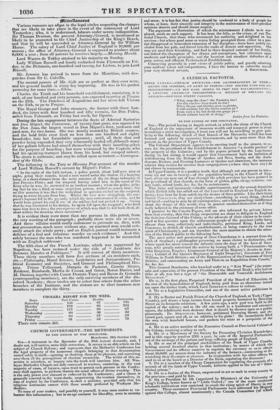CHURCH GOVERNMENT—THE METHODISTS.
TO THE EDITOR OF THE SPECTATOR.
Manchester, 29th October 1832.
Sin—A statement in the Spectator of the 20th instant demands, and, I .doubt not, will receive, some little correction. It occurs in an able article on the subject of Church Reform; and represents that the Methodist Conference has the legal 'pro.perty of the numerous chapels belonging to that denomination vested solely in itself,—opening or shutting them at its pleasure, and exercising over them all the prerogatives of absolute ownership. The writer of this as- sertion is mistaken, as inquiry into the truth will convince him. All, Wes- leyan Methodist Chapels are duly conveyed to trustees, consisting, in the vast majority of cases, of laymen, upon trust to permit such persons as the Confer- ence shall appoint, to perform therein the usual offices of divine worship. This is the only power ever claimed or enforced by the Conference; and a clause is generally inserted in the trust-deeds, empowering the trustees themselves, in case of neglect by the Conference, to elect a minister, provided only that his religious sentiments concur iith those usually professed by Wesleyan Me- thodists.
To some of your readers, and possibly to yourself, it may seem useless to vo- lunteer this information ; but in an age eminent for liberality, even to mistake
and error, it is but fair that justice should be rendered to a body of people for whom, at least, their sincerity and integrity in the maintenance of their peculiar opinions deserve and should insure respect. The argument in illustration of which the misstatement I allude to is em- ployed, needs no such support. It has been the folly, as the crime, of our Na- tional Church, that those who reverenced her authority and delighted in her services—but whose good sense or warm feeling prompted them either to a par- tial disapproval or benevolent extension of her discipline—have been rudely ex- cluded from her pale, and forced into the ranks of dissent and opposition. She may yet need their friendship, and find in these despised outcasts of her family, indeed ndeed the champions of her abuses and corruptions, but reformers upon moderate and kindly principles, and the heartiest and steadiest defenders of a pure, active, and efficient Ecclesiastical Establishment.
Concurring generally in your views of public policy, and greatly admiring your uniform talent and independence, I have the honour to subscribe myself



















































 Previous page
Previous page